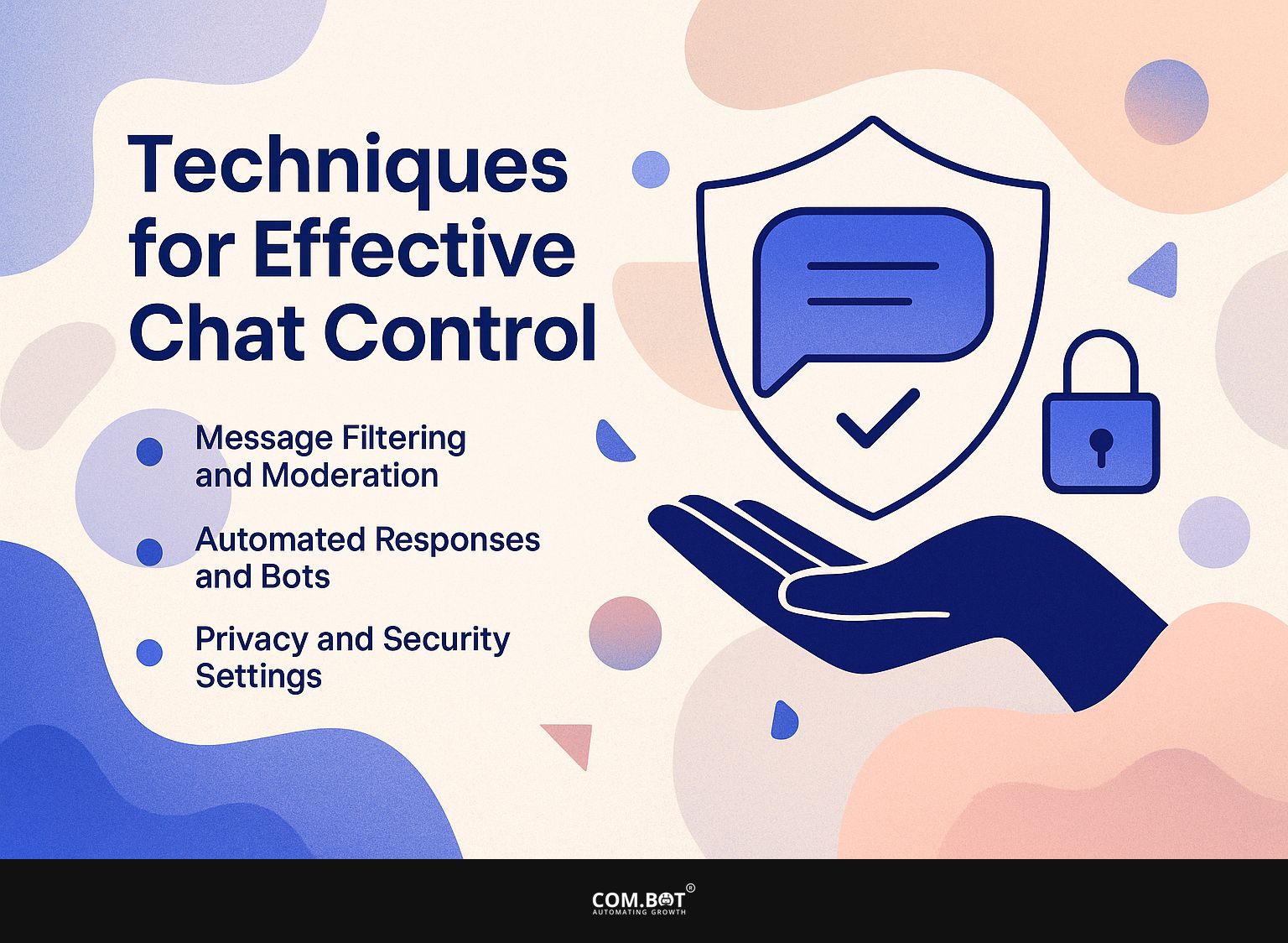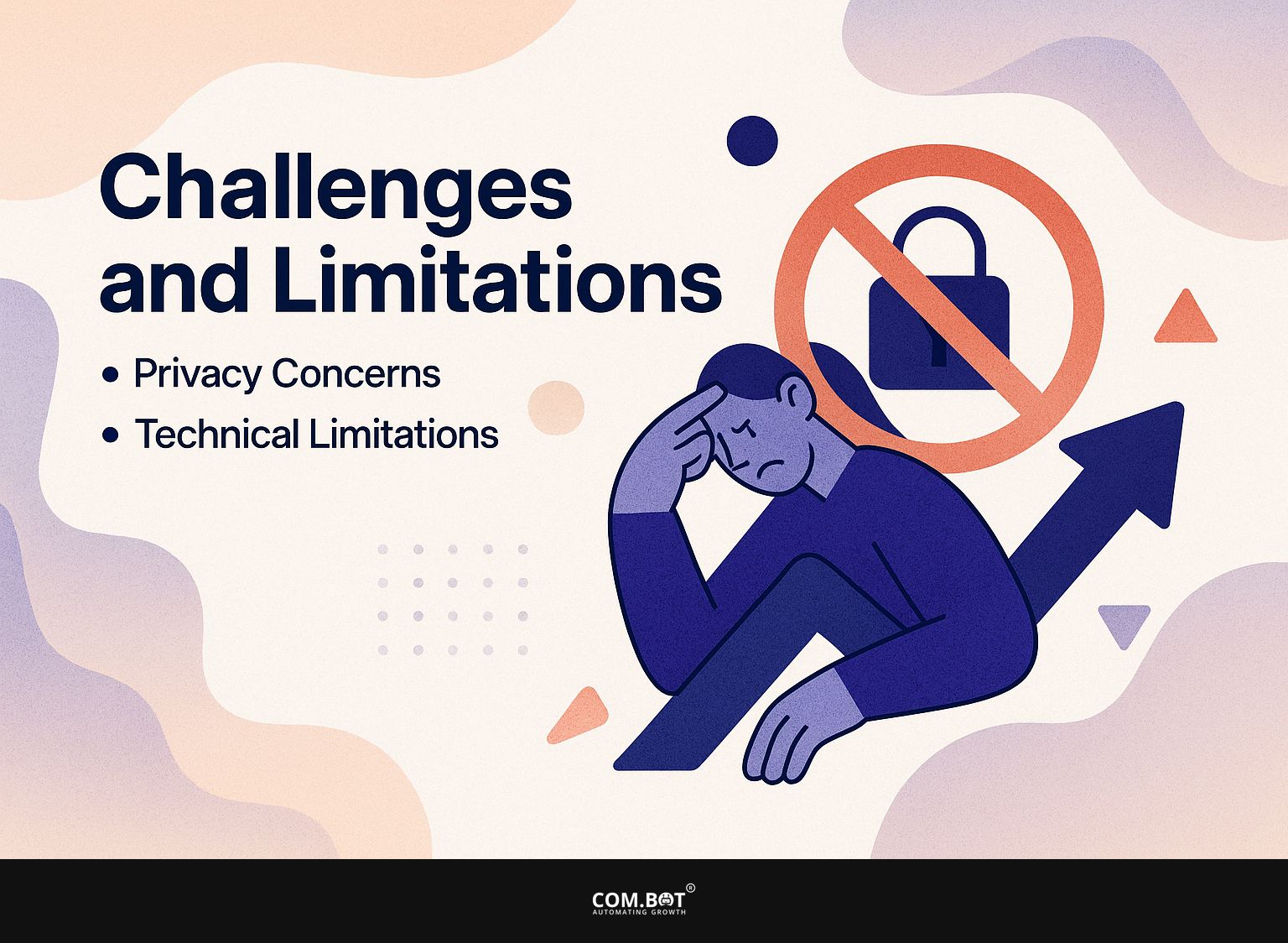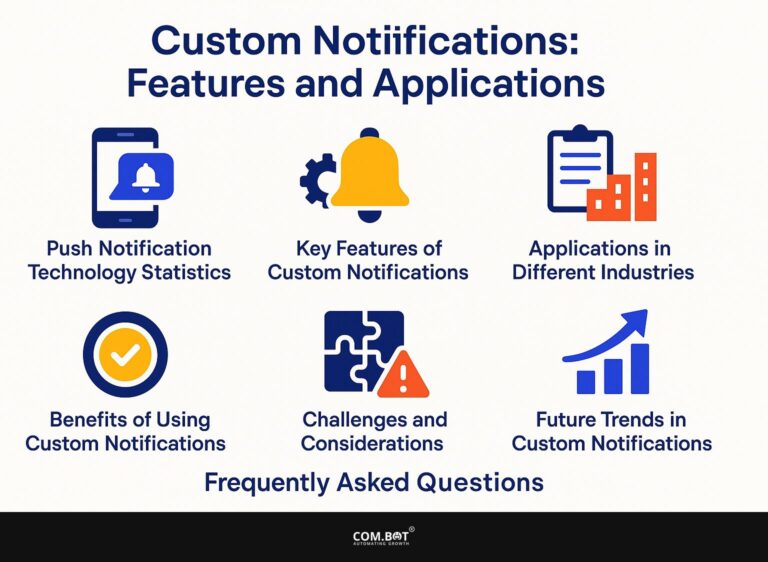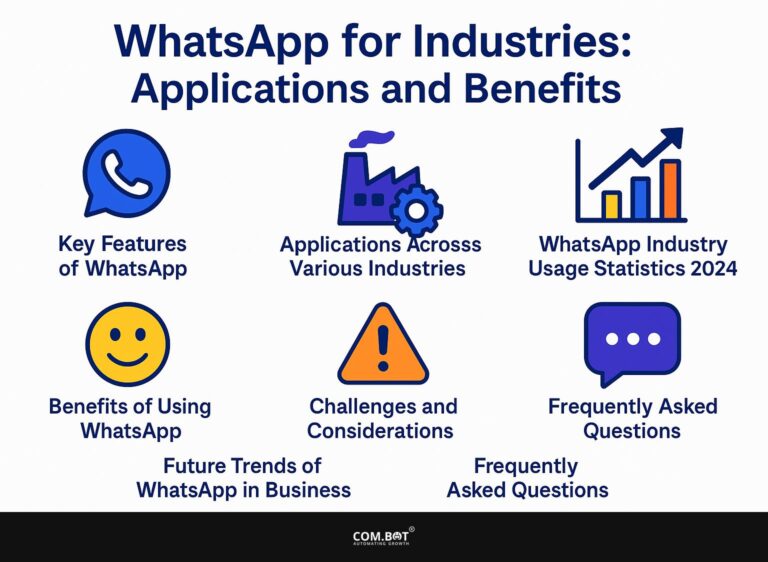WhatsApp Chat Control: Techniques and Applications

In a time when WhatsApp’s end-to-end encryption assures privacy for personal messages, there is a strong need for effective chat control. With growing worries about online safety, especially due to Ylva Johansson’s Child Sexual Abuse Regulation (CSAR), it’s important to understand how to control your privacy settings and secure your chats. This article looks at new methods and uses for chat control, helping users protect conversations while dealing with complicated rules.
Key Takeaways:
- Controlling WhatsApp chats is important for keeping conversations safe and ensuring the platform is secure.
- Methods like filtering messages, setting automatic replies, and adjusting privacy settings can handle and manage chat conversations successfully.
- Chat control can be used in areas like business, education, and community management. However, it also faces issues such as privacy worries and technical restrictions.
- 1 Techniques for Effective Chat Control
- 2 Applications of Chat Control in Various Sectors
- 3 WhatsApp Usage and Business Impact 2024
- 4 WhatsApp Usage and Business Impact 2024
- 5 Challenges and Limitations
- 6 Future Trends in Chat Control
- 7 Frequently Asked Questions
- 7.1 1. What is WhatsApp Chat Control and how does it work?
- 7.2 2. How can I use WhatsApp Chat Control to mute a chat?
- 7.3 3. Can I set privacy settings for individual contacts using WhatsApp Chat Control?
- 7.4 4. How do I archive a chat using WhatsApp Chat Control?
- 7.5 5. Are there any limitations to using WhatsApp Chat Control?
- 7.6 6. Can I undo actions taken through WhatsApp Chat Control?
1. Importance of Chat Control
Putting chat control measures in place can greatly improve online safety, keeping users safe from unauthorized access and harmful cyber threats.
By utilizing features like locked chats, users can restrict access to sensitive conversations. Disappearing messages add another layer of security, automatically erasing content after it has been read, reducing risks of data leaks.
In fact, studies show that over 60% of data breaches occur due to improper messaging practices. Tools like Signal and Telegram include these controls successfully, allowing users to feel secure when talking about private or sensitive topics.
This reflects broader trends in messaging app adoption during crises, such as the increased use of WhatsApp-the implications of which are discussed in our analysis of the Pandemic Impact on Messaging: WhatsApp Adoption. Regularly checking and changing these settings keeps consistent protection against new cyber threats.
2. Overview of Techniques
Good chat management methods include blocking certain messages, setting up automatic replies, and strong privacy protections to keep conversations safe.
Message filtering allows users to set rules for sorting incoming chats, helping to prioritize important conversations. Tools like Slack enable keyword-based filtering to alert on specific topics.
You can use tools like ManyChat to create automatic replies for common questions, making users happier and reducing wait times. Using privacy settings like two-factor authentication and customized visibility options helps protect personal information, ensuring secure interactions in both personal and professional settings.
Techniques for Effective Chat Control
To keep conversations on WhatsApp safe, using certain methods can greatly improve how secure and effective your messages are. Implement this by following the methodology in our Two-Factor Authentication via WhatsApp: Setup and Best Practices.

1. Message Filtering and Moderation
Utilizing message filtering allows users to screen incoming communications, effectively reducing spam and unwanted messages while prioritizing important conversations.
To implement message filtering on WhatsApp, start by organizing your chats. Use the `Archived Chats’ feature to separate less important conversations.
In group chats, adjust settings by tapping the group name, selecting ‘Mute Notifications,’ and choosing a duration. For better features, think about using third-party tools like AirDroid. This app lets you use WhatsApp on your computer and makes handling chats easier.
Set specific keywords for alerts in AirDroid to only be notified of relevant messages, minimizing distractions and keeping your focus on what matters most.
2. Automated Responses and Bots
Using automatic replies and chatbots can simplify communication on WhatsApp, offering quick responses and improving customer support.
To configure automatic replies in WhatsApp Business, go to the ‘Business Tools’ area. Configure quick replies for frequently asked questions like:
- ‘What are your hours?’
- ‘How can I track my order?’
Assign shortcuts for easy access. To make processes more efficient, use tools like Hoverwatch. It can track customer interactions and gather data to improve your responses. Set up automatic greeting messages so customers are welcomed right away when they contact you.
3. Privacy and Security Settings
Adjusting privacy and security settings on WhatsApp is essential for protecting personal data, with features like end-to-end encryption ensuring communications remain confidential.
- For better security, turn on two-step verification by going to Settings > Account > Two-step verification. This adds an extra layer of security by requiring a PIN when registering your phone number.
- Manage your visibility by going to Settings > Privacy. Here, you can choose who can see your last seen, profile photo, and status updates-opt for `My Contacts’ to limit visibility.
- Check your active sessions in Settings > Account > Security often to make sure no unknown devices are logged into your account.
Applications of Chat Control in Various Sectors
The use of chat control methods varies, affecting areas like business, education, and community management in different ways. These methods are particularly transformative in educational contexts, enhancing communication and learning experiences.
WhatsApp Usage and Business Impact 2024
One fascinating aspect is how WhatsApp is being effectively implemented within educational frameworks. Learn more about the benefits of WhatsApp in education to see how it supports both instructors and students in creating a more interactive learning environment.
WhatsApp Usage and Business Impact 2024
WhatsApp Key Statistics: User Demographics
WhatsApp Key Statistics: Usage and Engagement
WhatsApp Key Statistics: Business Statistics
The WhatsApp Usage and Business Impact 2024 Data gives a complete look at how many people around the world use the platform, the different types of users, how engaged they are, and how it affects business activities. This analysis showcases WhatsApp as a dominant communication tool and a significant player in the business ecosystem worldwide.
User Demographics highlight the extensive reach of WhatsApp, with 2.9 billion global monthly active users… making it one of the top messaging platforms. In the U.S., there are 100 million monthly active users showing its growth in a crowded market of messaging apps. The top three countries alone account for 750.5 million users, illustrating localized dominance in specific regions. Gender distribution shows a slight male predominance with 52.4% men and 47.5% women using the platform. This near-equal gender ratio indicates broad appeal across demographics.
Usage and Engagement metrics indicate high activity levels, with 100 billion messages sent daily. This figure highlights WhatsApp’s importance in daily communication. Additionally, 7 billion voice messages are sent daily, highlighting users’ preference for diverse communication modes. The weekly average posts stand at 4.7, with users spending an average of 33.1 minutes per day on the app. This engagement reflects the platform’s integration into daily routines and its role as a go-to communication tool.
Business Statistics reveal that 200 million users employ WhatsApp Business, signaling its significance for customer engagement and service delivery. With 152.1 million downloads With WhatsApp Business, companies are using the platform to improve communication with customers. The business revenue of $382 million highlights its economic impact and potential as a revenue-generating tool for businesses worldwide.
This data highlights WhatsApp’s important role in personal and business communication, securing its position as a key tool for user interaction and a profitable platform for businesses.
1. Business Communication
Using chat control in business communication can make customer interactions better, simplify support processes, and make team collaboration more effective.
For example, companies like Nike use WhatsApp to address customer queries quickly, employing chat moderation tools like Zendesk Chat to manage conversations. This lets them sort questions and assign team members based on their skills.
Similarly, a small business might use WhatsApp Business to set up automatic responses for common questions, helping operations go more smoothly.
New tools like ChatGPT can help create custom messages and provide quick, appropriate responses. By using these strategies, businesses can create stronger connections and increase customer happiness.
2. Education and Learning Environments
Schools use chat control to create secure environments where students and teachers can talk easily. To implement chat control measures effectively, schools can set up WhatsApp groups for class discussions while appointing a dedicated moderator. This moderator can oversee conversations, ensuring rules are obeyed and promptly dealing with any rule-breaking.
Institutions may also establish clear policies on acceptable language and behavior in these groups, which can be shared during orientation.
Using tools such as Google Forms for anonymous reporting allows students to report inappropriate content without worrying about backlash. Using these strategies creates a setting where trust and participation are valued, improving the learning experience.
3. Community Management
Good chat control is important for running communities, ensuring discussions remain positive and free of harmful content.
To do this, community managers should use tools like WhatsApp Business API for automatic replies and sorting messages. Establish clear guidelines for group interactions, emphasizing respect and constructive feedback. Urge users to report unsuitable content via a specific channel, allowing for quick response.
Frequently check group activity to spot new problems and create a secure setting. Think about choosing moderators from the community to watch over chats and make sure rules are followed. This can help members feel more committed to keeping the group honest.
Challenges and Limitations
While chat control in WhatsApp has advantages, it also encounters problems that may affect clear communication and user security.

1. Privacy Concerns
Privacy concerns such as digital surveillance and unauthorized access can undermine the effectiveness of chat control measures on WhatsApp.
To address these issues, implement strategies for safeguarding your data. Begin by doing regular security checks to find weaknesses in your settings.
Use complete encryption like WhatsApp does, and make sure your group chats are safe by controlling who is allowed to join.
Educate users about potential phishing attempts, emphasizing the importance of not sharing verification codes. Consider using two-factor authentication to add an extra layer of protection to your account, further mitigating risks from unauthorized access.
2. Technical Limitations
Technical limitations, including software bugs and compatibility issues, can restrict the full implementation of chat control features on WhatsApp.
Common issues include undelivered messages and delays due to outdated software. Make sure your device and WhatsApp app are updated. Regularly check for updates in your app store.
Network connectivity problems can lead to functionality hiccups; switch between Wi-Fi and mobile data to see what works best.
For API integrations, use tools like Zapier to simplify connections, and make sure to test each path for reliability. Record any mistakes you find and contact support if problems keep happening, as they can offer quick solutions or alternatives.
Future Trends in Chat Control
Chat management on WhatsApp is set to change with the use of AI and machine learning, allowing more intelligent communication options. This transformation is particularly crucial for businesses looking to enhance their communication strategies, as demonstrated in our analysis of AI WhatsApp Bots: Boosting E-commerce Sales and Business Communication.

1. AI and Machine Learning Integration
Using AI and machine learning in chat control helps handle moderation tasks without human intervention, speeding up response times and improving user experience on WhatsApp.
For example, predictive moderation tools like Tidio and ModSquad use AI to analyze chat patterns, flagging inappropriate content before it’s visible to users.
With Tidio, you can set up custom rules that automatically remove messages containing specific keywords. Intelligent spam filters, such as those offered by G2, learn from user interactions to identify and block unwanted messages over time.
These tools help with communication and allow human moderators to focus on difficult issues, making the platform safer and more engaging for users.
2. Emerging Features and Updates
Emerging features and regular updates from WhatsApp are continuously enhancing chat control capabilities, ensuring higher encryption integrity and user privacy.
Recent updates include adjustable privacy settings and improved end-to-end encryption. Users can now decide who can view their last seen status or read receipts.
For instance, the ability to mute specific chats helps users focus on important conversations, reducing distractions. Letting messages disappear after a specified time makes things safer. Users can set messages to delete themselves, stopping sensitive information from being stored permanently.
As these options become available, users are likely to engage more selectively, enhancing their overall chat experience.
Frequently Asked Questions
1. What is WhatsApp Chat Control and how does it work?
WhatsApp Chat Control is a feature that allows users to control their chats and messages on the app. This feature includes options such as muting specific chats, archiving conversations, and setting privacy settings for individual contacts.
2. How can I use WhatsApp Chat Control to mute a chat?
To mute a chat, simply open the chat and tap on the three dots in the top right corner. From there, select “Mute” and choose the desired time period for the chat to be muted. This will prevent any notifications or sounds from that chat for the selected time period.
3. Can I set privacy settings for individual contacts using WhatsApp Chat Control?
Yes, you can. In the same menu where you can mute a chat, you will find “Privacy.” Here, you can block a contact, hide when you were last online, and decide who can see your profile picture and about info.
4. How do I archive a chat using WhatsApp Chat Control?
To archive a chat, swipe left on the chat and tap on the “Archive” option. This will move the chat to the Archived Chats folder, where it will be hidden from your main chat list. You can access archived chats by scrolling to the top of your chat list and selecting “Archived Chats”.
5. Are there any limitations to using WhatsApp Chat Control?
Currently, there are no limitations to using WhatsApp Chat Control. This feature is available only on the WhatsApp mobile app, not on the desktop version.
6. Can I undo actions taken through WhatsApp Chat Control?
Yes, you can. If you accidentally archive a chat, mute it for too long, or block a contact, you can fix these actions by going to the Archived Chats folder, holding down on the chat, and choosing the option to undo. Keep in mind that you can only choose this option for a short period after the action is done.





